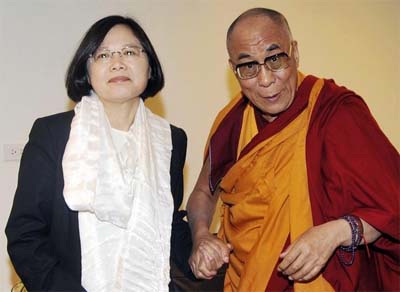Beijing issued its usual cookie-cutter response of resolute opposition to the Dalai Lama’s separatist activities. However, instead of aiming its ammunition at the ruling Kuomintang (KMT) government who had granted the visit, China directed its rebuke at the opposition DPP, who had invited the Dalai Lama to ‘comfort’ the victims of the disaster.
The DPP’s invitation was widely seen by many from the Mainland and the ruling KMT as a highly politicised exercise designed to further undermine President Ma Ying-jeou’s position after his lacklustre performance during the rescue effort. Refusal to admit the Dalai Lama could be easily interpreted as kowtowing to Beijing, though allowing him to visit Taiwan would no doubt create tension over the much improved but still delicate cross-Strait relationship.
The DPP’s action can be seen as nothing more than a highly opportunistic act to attack the KMT by invoking the issue of Taiwan’s relationship with the Mainland.
The ruling parties in Beijing and Taipei showed considerable restraint and maturity in dealing with the matter and didn’t allow it to escalate out of hand. Beijing didn’t intend to place the more China-friendly Ma government in an embarrassing situation, and it might have learnt a lesson or two from its recent infantile handling of Rebiya Kadeer’s visit to Australia, when its smear campaign led to an unexpected boost of her public profile. It is rather the DPP which looked awkward during the whole affair. It seems that its political spin had gone a bridge too far for the media and the public.
This episode highlighted the most significant dilemma and policy challenge for the opposition DPP in Taiwan after its disastrous defeat in the 2008 election, namely how to handle the cross-Strait relationship. While the KMT is working hard to rebuild Taiwan’s tattered relationship with the Mainland, the DPP is becoming increasingly beholden to its pro-independence Deep Green core constituency, and it is close-to-dogmatic in its pursuit of an independent Taiwanese identity and de jure statehood. The DPP has consistently exploited the issue to its advantage and it seems that it had became its sole raison d’être.
Some senior DPP members have realised that without a viable cross-Strait strategy, it is likely to remain in the political wilderness for many years to come. However, two senior DPP figures were promptly punished by the Party leadership for their unauthorised visit to the Mainland. It seems that the DPP is not yet ready to enter into a dialogue with Beijing.
The DPP must be ready to confront its China demons and modify its insistence on Taiwanese independence to make it electable to the Taiwanese voters. There might be very little appetite in Taiwan for unification with the Mainland; however, the majority of people made it clear through their votes that they are not ready to pay the price of de jure independence.


The new approach by mainland China, if it is maintained for the foreseeable future, is likely to have profound implications for the politics in Taiwan.
In this new environment, the Democratic Progressive Party (DPP) in Taiwan will find it difficult to be relevant unless it makes relevant policy changes.
When China and Taiwan are further integrated practically day by day, the future of the two sides is likely to have a looser union than the model for both Hong Kong and Macau, possibly using the model of a federation, with much higher autonomy for Taiwan, including all its own affairs including internal security and many external presentation within the framework of a new federation.
What will be role in that framework for DDP? It is unclear, because its basis has been for independence.